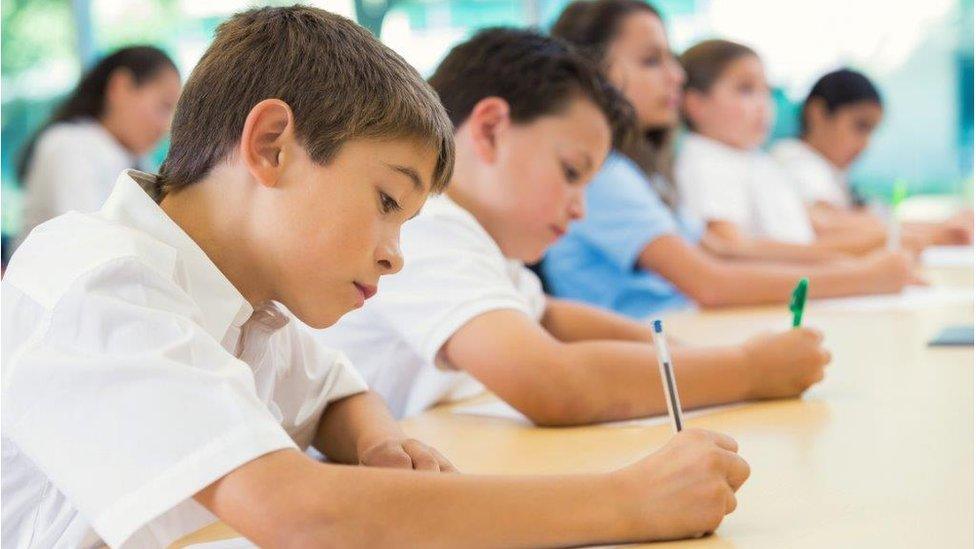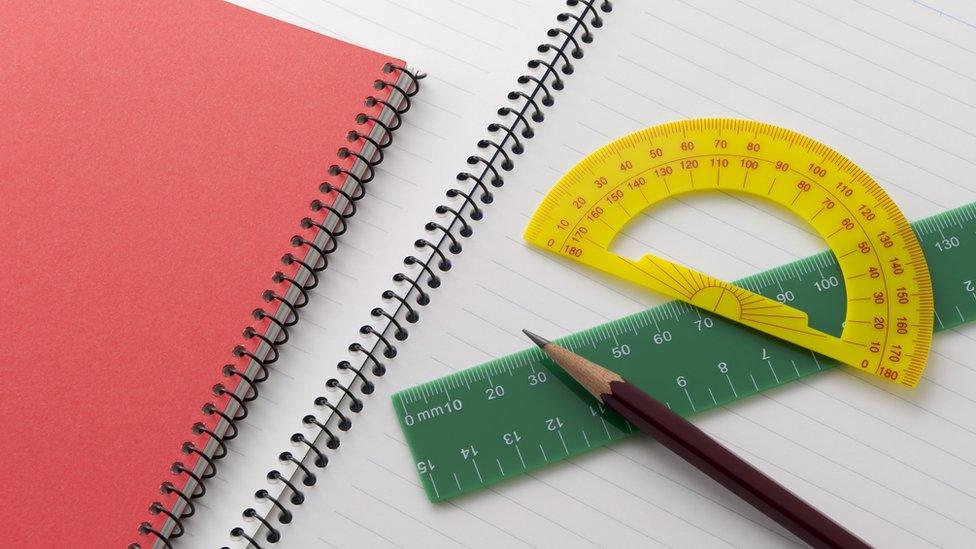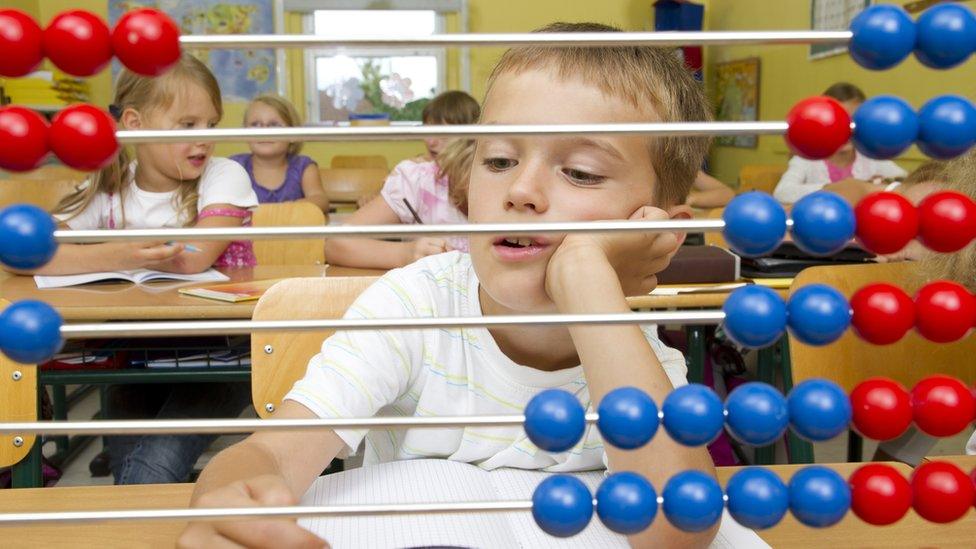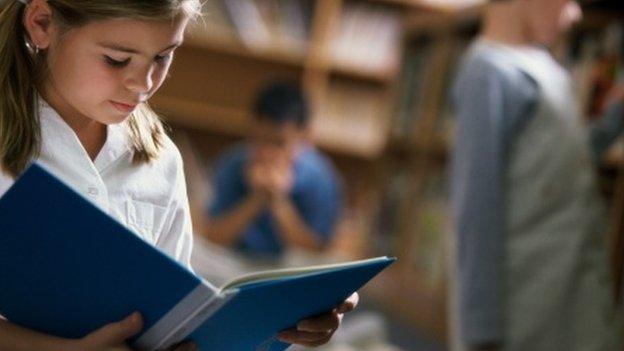Do Sats really matter - and if so, to whom?
- Published

Children in their final year of primary school in England sit their national curriculum tests, often known as Sats, this week - but who is really being tested?
Are Sats a test of the school or the child?
The tests measure children's progress, but the results are used to compare schools.
They started on Monday with tests for 11-year-olds in English grammar, punctuation and spelling and end on Thursday with maths.
Similar tests for seven-year-olds also get under way this month, but there is no set timetable and these tests are due to be scrapped altogether by 2023.
Only the tests taken by 11-year-olds are marked externally.
Ultimately the results are used to hold schools to account for the attainment of their pupils and the progress that they make.
Progress is measured by comparing the results of tests taken at the end of Key Stage 1, by seven-year-olds, and those taken at age 11.
Schools are expected to meet a minimum "floor standard".
Schools are below the floor standard if under 65% of pupils meet the expected standard in reading, writing and mathematics and they fail to make sufficient progress in all three subjects.
Are parents given the results for their own children?
In July parents are given their own children's raw scores (the marks they get) and are told whether or not they are at the expected level.
The reading and maths test scores are given on a scale of 80 to 120 - with a score of 100 or more meaning a pupil is meeting the expected standard.
Writing is assessed by the children's own teachers, who have to decide whether individual pupils are meeting or exceeding the expected standard.

What do primary schools do with the results?
The results of Sats tests taken by 11-year-olds are published each year in primary school league tables produced by the Department for Education, external.
A facility on the website allows users to rank schools in England by different measures, for example to compare schools with the national average and with other local schools.
The league tables are often the first port of call for parents who want to choose schools for their children or simply judge how well schools in their area are doing.
But many education experts say the tables show only how well a particular year group of pupils at a given school has performed in tests or exams.
They argue that the tables often say more about the intake of a school than the teaching and learning that goes on there.
Critics also say the tables encourage competition, rather than collaboration, between schools in local areas and can lead to middle-class parents pushing to get their children into top schools, further driving down standards at less popular schools.
Educationalists also say the tables reveal nothing about the extra-curricular activities on offer such as sport and drama or details about a school's pastoral care system and say there is no substitute for visiting a school you are interested in sending your child to or talking to teachers, parents and current pupils.
Ministers say the tables help drive up standards by providing valuable information for parents and increasing local accountability.
And research carried out by Bristol University suggested the abolition of league tables in Wales in 2001 had led to a drop in standards in about three-quarters of schools.
How do secondary schools use them?
Sats results are definitely part of the picture when it comes to secondary schools deciding how to pitch lessons to their new Year 7s and, if they use setting and streaming, to gauge where to put individual pupils.
"Sats are accurate in terms of the knowledge they are testing... but they are only part of the picture," says Julie McCulloch, director of policy with the Association of School and College Leaders.
Children take them in only English and maths and they test only a subset of what they can do in those subjects, she says.
So, most schools also do their own tests to help rate the new arrivals' abilities.
However, according to Ms McCulloch there is no substitute for building a dialogue with Year 6 teachers at feeder primary schools, "so that learning can continue as effectively as possible".

How does Ofsted use Sats results?
The test results form part of Ofsted inspection reports on schools, although inspectors are also meant to consider other parts of the primary curriculum not included in the tests.
However, last year a report by MPs, external expressed concern that too many inspection reports were overly focused on English and maths "and can neglect other national curriculum subjects like science".
"Ofsted has significant power to influence school behaviour, and neglecting to comment on core parts of the curriculum contributes to the overemphasis on English and maths teaching at primary school," it said.
"The Ofsted framework already includes the importance of a broad and balanced curriculum, but this does not appear to translate into every inspection report," the MPs wrote.
The report recommended that "every report should specifically include science as a core subject alongside English and maths, as well as a range of other areas of the curriculum and extra-curricular activities".
In October, Ofsted's chief inspector, Amanda Spielman, indicated a likely change in inspection priorities for primary schools when she warned of too much focus on tests and exams too often at the expense of "rich and full knowledge".
"I acknowledge that inspection may well have helped to tip this balance in the past," Ms Spielman said.

Parents are advised to make sure their children read regularly to boost results
Should children relax or revise before Sats?
Government advice is that schools will ensure that pupils are well prepared, external for the tests and parents and pupils should follow teachers' instructions throughout the year.
Parents need to make sure that any homework is completed on time and to a good standard and should encourage their children to read regularly, says the advice.
Some schools will hold revision sessions in school time and might set some extra homework. But every year there a stories of schools who advocate a different approach immediately before the tests.
This year Year 6 pupils at the Flying Bull Academy in Portsmouth struck power poses ahead of their tests.
And in 2016 copies of a letter sent out to pupils by several schools went viral.
"We know how hard you have worked," said the letter.
It told children: "While you are preparing for the test and in the midst of it all remember there is no way to 'test' all of the amazing and awesome things that make you you.
"Sleep, rest, believe and sparkle."